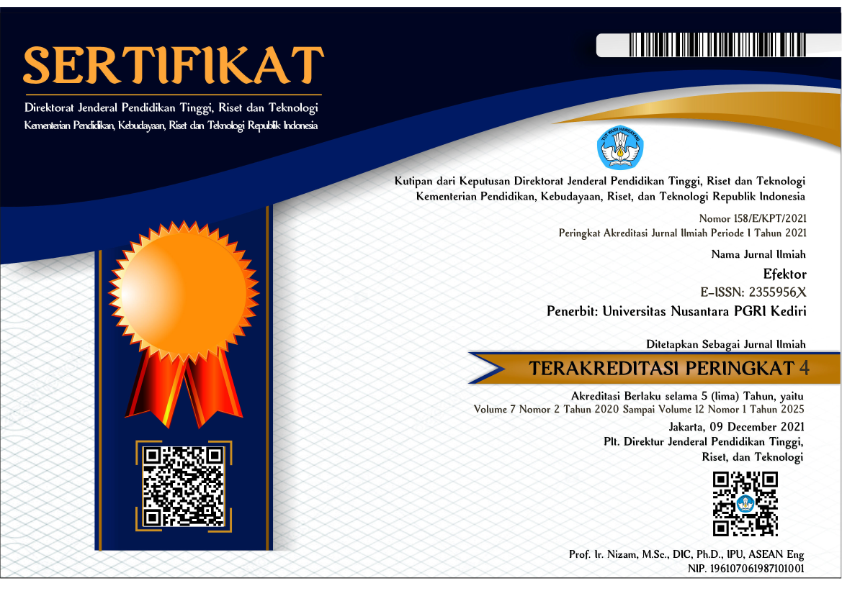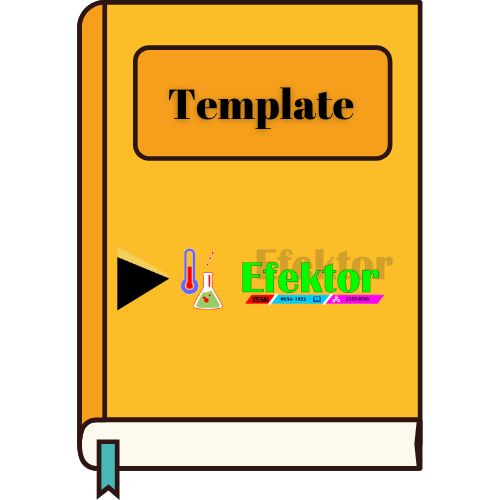Analisis Pemahaman Konsep Mahasiswa pada Topik Vektor
DOI:
https://doi.org/10.29407/e.v6i2.12911Keywords:
pemahaman konsep, vektor, mahasiswaAbstract
This study reveals students' understanding of vectors related to the addition of vectors, vectors and vector units. To achieve these objectives, three formatted question sections are actually packaged in an android application. Each section consists of three questions that discuss different subtopics. Part 1 discusses the subtopic vector addition, part 2 discusses vectors and part 3 unit vectors. This research was conducted at 40 years of undergraduate students of Physics Education, State University of Malang. The results of the analysis show that students have an understanding of good addition vectors in subtopics, but still weak in subtopics storing vectors and arranging large vectors based on unit vectors.
References
Barniol, P., & Zavala, G. (2014). Test of understanding of vectors: A reliable multiple-choice vector concept test. Physical Review Special Topics - Physics Education Research, 10(1), 010121. https://doi.org/10.1103/PhysRevSTPER.10.010121
Bollen, L., van Kampen, P., Baily, C., Kelly, M., & De Cock, M. (2017). Student difficulties regarding symbolic and graphical representations of vector fields. Physical Review Physics Education Research, 13(2), 020109. https://doi.org/10.1103/PhysRevPhysEducRes.13.020109
Bollen, L., van Kampen, P., & De Cock, M. (2015). Students’ difficulties with vector calculus in electrodynamics. Physical Review Special Topics - Physics Education Research, 11(2), 020129. https://doi.org/10.1103/PhysRevSTPER.11.020129
Docktor, J. L., & Mestre, J. P. (2014). Synthesis of discipline-based education research in physics. Physical Review Special Topics - Physics Education Research, 10(2), 020119. https://doi.org/10.1103/PhysRevSTPER.10.020119
Gumrowi, A. (2016). Strategi Pembelajaran Melalui Pendekatan Kontekstual dengan Cooperative Learning untuk Meningkatkan Hasil Belajar Gelombang Siswa Kelas XII MAN 1 Bandar Lampung. Jurnal Ilmiah Pendidikan Fisika Al-Biruni, 5(2), 183–191. https://doi.org/10.24042/jpifalbiruni.v5i2.118
Hammer, D. (2000). Student resources for learning introductory physics. American Journal of Physics, 68(S1), S52–S59. https://doi.org/10.1119/1.19520
Hegde, B., & Meera, B. N. (2012). How do they solve it? An insight into the learner’s approach to the mechanism of physics problem solving. Physical Review Special Topics - Physics Education Research, 8(1), 010109. https://doi.org/10.1103/PhysRevSTPER.8.010109
Kurniawan, B. R., & Taqwa, M. R. A. (2018). Seminar Nasional Pembelajaran IPA ke 3. Pembelajaran IPA berbasis Kehidupan untuk Generasi Z di Era Disruptif, 3, 51–55. Universitas Negeri Malang: Prodi Pendidikan IPA, FMIPA, Universitas Negeri Malang.
Nguyen, N.-L., & Meltzer, D. E. (2003). Initial understanding of vector concepts among students in introductory physics courses. American Journal of Physics, 71(6), 630–638. https://doi.org/10.1119/1.1571831
Poniman, P. (2016). Upaya Peningkatan Aktivitas dan Hasil Belajar Fisika dengan Metode Praktikum pada Siswa Kelas XI IPA MAN 1 Kalianda Lampung Selatan. Jurnal Ilmiah Pendidikan Fisika Al-Biruni, 5(2), 257–264. https://doi.org/10.24042/jpifalbiruni.v5i2.125
Sari, H. K. (2016). Peningkatan Keterampilan Proses Sains dan Hasil Belajar Fisika Siswa pada Model Pembelajaran Kooperatif Tipe Student Team Achievement Division. Tadris: Jurnal Keguruan Dan Ilmu Tarbiyah, 1(1), 15–22.
Sari, W. P., Suyanto, E., & Suana, W. (2017). Analisis Pemahaman Konsep Vektor pada Siswa Sekolah Menengah Atas. Jurnal Ilmiah Pendidikan Fisika Al-Biruni, 6(2), 159–168. https://doi.org/10.24042/jipfalbiruni.v6i2.1743
Serway, R. A. (2013). College physics: hybrid pkg (10th Ed). Boston, MA: Cengage Learning.
Susiharti, S., & Ismet, I. (2017). STUDI KESALAHAN SISWA DALAM MENYELESAIKAN SOAL-SOAL VEKTOR DI SMA NEGERI 1 INDERALAYA. Jurnal Inovasi dan Pembelajaran Fisika, 4(1). Retrieved from https://ejournal.unsri.ac.id/index.php/jipf/article/view/4296
Yusuf, M. Y., & Amin, M. (2016). Pengaruh Mind Map dan Gaya Belajar terhadap Hasil Belajar Matematika Siswa. Tadris: Jurnal Keguruan Dan Ilmu Tarbiyah, 1(1), 85–92.
Downloads
Published
Issue
Section
License
Authors who publish with this journal agree to the following terms:
- Copyright on any article is retained by the author(s).
- The author grants the journal, the right of first publication with the work simultaneously licensed under a Creative Commons Attribution License that allows others to share the work with an acknowledgment of the work’s authorship and initial publication in this journal.
- Authors are able to enter into separate, additional contractual arrangements for the non-exclusive distribution of the journal’s published version of the work (e.g., post it to an institutional repository or publish it in a book), with an acknowledgment of its initial publication in this journal.
- Authors are permitted and encouraged to post their work online (e.g., in institutional repositories or on their website) prior to and during the submission process, as it can lead to productive exchanges, as well as earlier and greater citation of published work.
- The article and any associated published material is distributed under the Creative Commons Attribution-ShareAlike 4.0 International License













